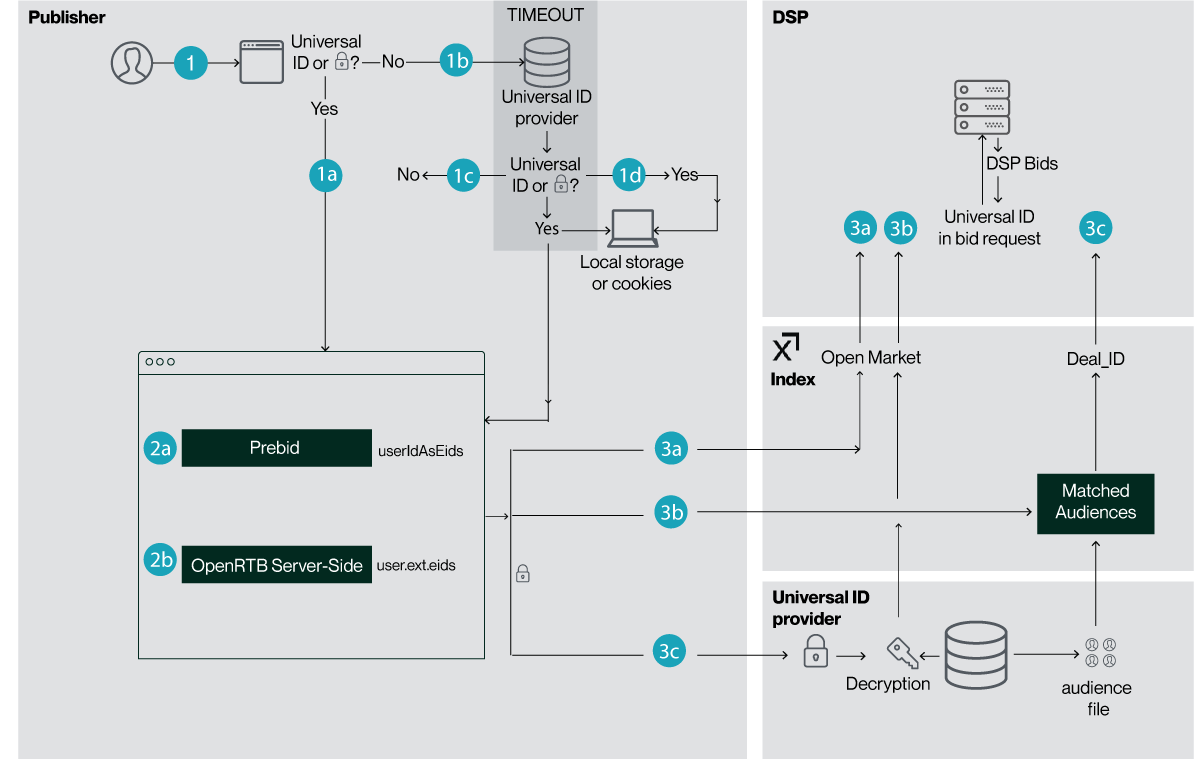At Index Exchange (Index), a Universal ID provider refers to an identifier associated with users or devices, and is commonly used by all providers across the supply path. Buyers who use a Universal ID provider can enable audience targeting that uses user data such as brand or publisher first-party data, remarketing, and behavioral targeting. By enabling a Universal ID provider, Media Owners can pass a Universal ID to buyers in the bid request. Buyers who have enabled the same Universal ID provider as the Media Owner can use the Universal ID to connect the user to the corresponding data that they have saved.
Publishers benefit from using a Universal ID provider because buyers are willing to bid higher when they have a notion of a user or device. As a result, Media Owners who use a Universal ID provider typically receive higher bids.
Buyers benefit from using a Universal ID provider because they can more effectively reach specific audiences through the open market or through a deal ID. As a result, buyers can deliver the right message to relevant audiences, creating a more personalized experience, as well as control ad frequency and measure results.
Index supports two types of Universal IDs to help Media Owners and buyers better identify their users:
Authenticated ID: A type of Universal ID that is based on user-level information such as an anonymized email address or phone number. This type of ID can associate a known user across multiple devices.
Inferred ID: A type of Universal ID that is used when an email address or phone number isn't available to brands or Media Owners. Unlike an authenticated ID, an inferred ID is device-level. It's created when a user visits a publisher's site and is used to retarget that same user when they make future visits on publisher sites.
Supported Universal ID providers
At Index, we currently support the following Universal ID providers:
33Across
Central and Eastern Europe ID
Criteo
Epsilon
European Unified ID (EUID)
First-id
Google PAIR ID
ID5
LiveIntent
LiveRamp
Loblaw LMPID
Lotame
netID
NovatiqId
SharedID
TrustPid
Unified ID
Utiq
Yahoo ConnectID
For more information on our supported Universal ID providers, see
How Universal IDs are passed in bid requests

| When a user visits a publisher site with a Universal ID provider enabled, the Media Owner's integration has a set amount of time to retrieve a Universal ID and include it in the bid request before a timeout occurs. The following will occur depending on whether a Universal ID is available:
|
| If a Universal ID is retrieved before the timeout occurs, it is made available to Index using one of the following methods depending on the Media Owner's integration type:
Note: If the Media Owner is using a Universal ID that requires decryption, there will be an encrypted envelope that contains the Universal ID that is decrypted in step three. |
| Depending on the Universal ID provider that the Media Owner has enabled, one of the following will occur:
|



